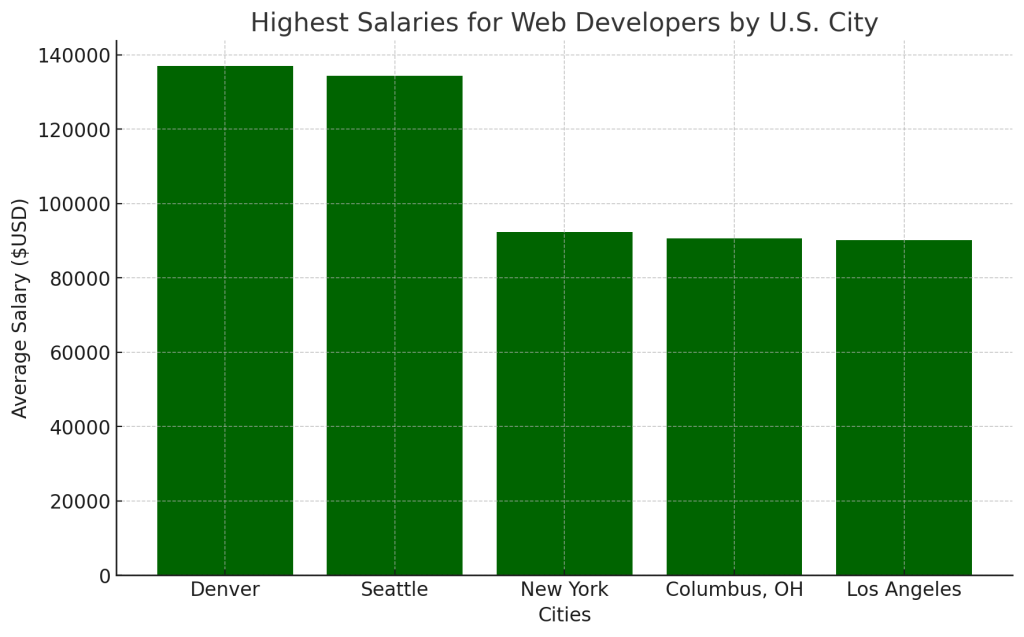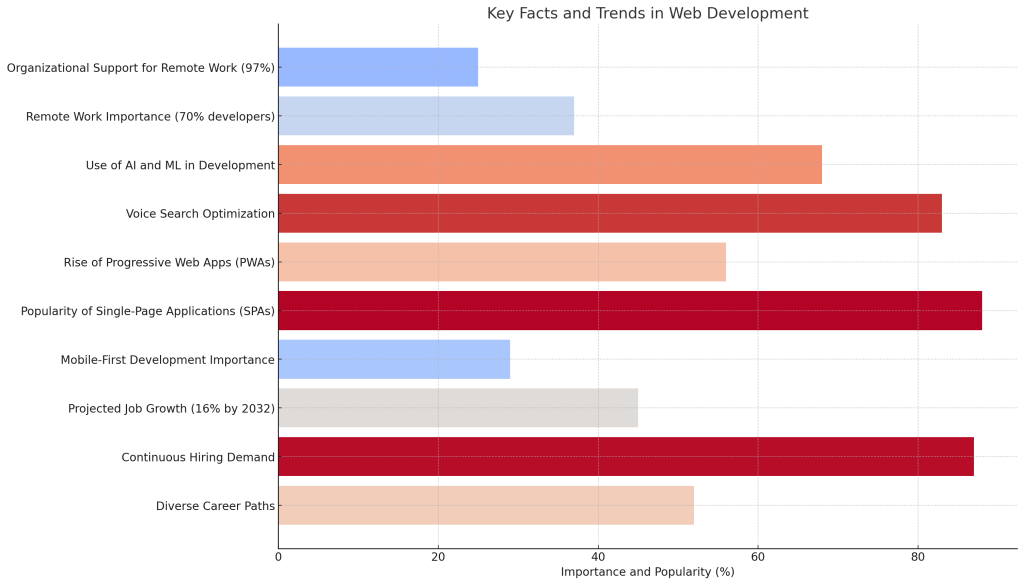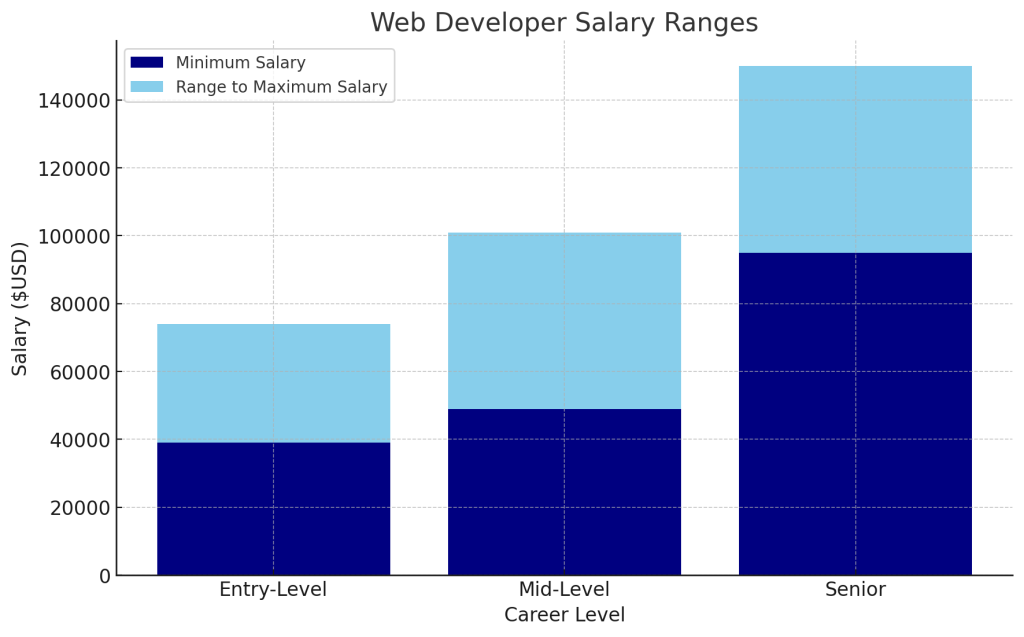
How to Become a Web Developer (2024 Overview and Roadmap)
Web developers are the creative professionals who develop websites and web applications that power our digital world. Using programming languages like HTML, CSS, JavaScript, and frameworks like React, Angular, and Vue.js, web developers build, design, and maintain the websites and apps we interact with on a daily basis.
Web development integrates concepts of software engineering and computer programming with creative design to produce functional and engaging online experiences tailored to end users’ needs. As e-commerce and web usage continues growing rapidly, driven partly by trends like increasing remote work and reliance on online services, the role of web developers becomes critically important. Web developers use both technical skills and creative problem-solving to bring ideas to life on the web.
Web developers fall primarily into three main specializations: front-end developers, back-end developers, and full-stack developers. Some also work specifically as webmasters. On the surface, these roles differ in their focus on either user-facing design or behind-the-scenes server-side logic. But at their core, they all center on using programming languages and development tools to create websites and applications.
The field offers dynamic, fast-paced work balancing both structured technical tasks and unstructured creative challenges. Professionals have opportunities spanning industries from software and IT to marketing, e-commerce, education, and beyond. For technologically-inclined creative thinkers, a career in web development brings together the best of both worlds.
Overview of Web Development
| Topic | Aspect | Description |
|---|---|---|
| Web Development | Definition | Integration of software engineering and creative design |
| Programming Languages | Core | HTML, CSS, JavaScript |
| Frameworks | Examples | React, Angular, Vue.js |
| Web Developer | Specializations | Front-end, Back-end, Full-stack, Webmaster |
| Skills | Technical | Secure coding, database management, responsive design |
| Trends | Current | Remote work, AI and ML integration, e-commerce growth |
| Future Prospects | Job Growth | 16% increase projected through 2032 |
What Types of Careers Can You Have as a Web Developer?
Web developers typically specialize in one of three main areas: front-end development, back-end development, or full-stack development. Some also work specifically as webmasters managing websites. Each role works with different elements of a website:
- Front-end web developers focus on the visual design and user interface. They develop the HTML, CSS, and JavaScript code powering website layout, navigation menus, graphics, and interactivity.
- Back-end web developers concentrate on behind-the-scenes server-side logic. They write code in languages like JavaScript, Python, and PHP to manage site database integration, server configuration, business logic, and data processing.
- Full-stack web developers handle both front-end and back-end duties. In smaller teams without dedicated roles, full-stack developers take a site from concept to completion.
- Webmasters primarily manage deployed websites. They monitor ongoing performance, update site content, and ensure links, applications, security, and technical SEO are working optimally.
What is the Difference Between Web Designers and Web Developers?
Web designers concentrate more on site’s visual aesthetics, branding, imagery, and content presentation using tools like Photoshop. Web developers focus on writing functional code to create those designs, using languages like HTML, CSS, JavaScript, and frameworks like React.
The roles overlap significantly despite different core focuses. Successful collaboration between designers and developers ensures a site looks great while still remaining fast and functional behind the scenes.
How Much Do Web Developers Earn?
Strong demand translates into lucrative salaries for qualified developers. According to PayScale.com, the average web developer salary ranges from $52,224 for entry-level to $91,476 for senior roles, with the median pay according to the US Bureau of Labor Statistics at $80,730. Years of experience, specific skills, company size, and location impact earnings.
Below is a breakdown of typical web developer salary ranges:
According to Burning Glass, senior developers with specialized expertise can earn upwards of $140,000, especially in high cost-of-living technology hubs like Silicon Valley.
With US Bureau of Labor Statistics projecting over 16% industry job growth through 2032, strong salaries will likely persist amidst fierce competition for top talent. Expanding e-commerce and Internet adoption worldwide is driving massive demand increases for skilled web development professionals.
How Do Web Developer Salaries Compare City to City?
While the United States boasts some of the highest web developer salaries globally, significant variations exist between different cities within the country. This disparity is driven by factors such as cost of living, industry concentration, and the presence of major tech hubs.
According to data from Indeed, the U.S. cities with the highest salaries for web developers are:

What Other Benefits Do Web Developers Receive Besides Salary?
Alongside lucrative base compensation, developers enjoy advantages like stock options at technology companies, signing bonuses when changing jobs, profit sharing, 401K matching, and pre-IPO opportunities. Most salaried roles include standard benefits like health/dental insurance, paid vacation days, work from home flexibility, professional development funds, and more.
However, those working as self-employed contractors forgo benefits for higher hourly pay and flexibility in when, where, and how long they work. Contractors must be disciplined in areas like taxes, insurance, retirement savings, and finding new business.
What Specific Skills Are Required to Be a Web Developer?
Mastering a diverse repertoire of specialized technical skills and interpersonal workplace skills paves the path to an engaging web development career. While specific role duties differ, essential abilities like programming proficiency unite successful developers.
Technical Web Development Skills
All developer roles involve coding websites, applications, or programs by writing and editing source code in various programming languages. Here are some of the most universal technical skills web developers need:
Core Languages:
- HTML: Creates web page structure and content
- CSS: Controls visual design like colors, fonts, layout
- JavaScript: Adds interactive elements and dynamic functionality
Collaboration Tools:
- Git: Enables source code version control and team collaboration during web development
Web Frameworks/Libraries:
- React: A JavaScript library for building fast user interfaces
- Angular: A TypeScript-based web framework for building single-page applications
- Vue.js: A progressive JavaScript framework for building user interfaces
Web Design Skills:
- Responsive web design: Creates sites adapting seamlessly to any device
- Web accessibility: Designs interfaces usable by those with disabilities
- UX design: Crafts intuitive, user-centered interfaces
Grasping these programming languages and tools empowers developers to build fully-functional websites and applications.
Want To Learn Computer Science From Home?
Jessup University’s Unique Online BS in Computer Science Can Make It Happen!
Workplace Skills Crucial for Web Developers
Soft skills like communication, adaptability, and business acumen also critically distinguish successful developers:
- Communication: Explains technical concepts understandably to collaborators
- Creativity: Brings fresh ideas solving problems from new angles
- Adaptability: Adjusts quickly learning new languages, frameworks, and methodologies
- Prioritization: Balances urgent requests while delivering important big-picture items
- Business skills: Aligns work towards key company goals and target users
Mastering both specialized technical abilities alongside universal interpersonal talents allows developers to provide immense value as they translate ideas into reality through code.
What Are Some Typical Web Developer Job Duties and Tasks?
Web developers’ responsibilities span areas like programming core site functionality, integrating multimedia features, implementing designs, testing applications, debugging issues, deploying updates, and gathering user feedback.
What is the difference between front end and back end web development? Here is a typical high-level overview of key duties across both of these developer roles, along with full-stack and webmasters:
Front-End Web Developers
- Design site navigation menus, page layouts, and UI components in tools like Figma
- Translate mockups into HTML, CSS, and JavaScript code
- Integrate graphics, video, and audio content
- Build and incorporate APIs
- Ensure responsiveness on all devices
- Perform UI testing from UX perspective
- Optimize performance
Back-End Web Developers
- Architect server-side application logic and behavior
- Develop custom application functionality and program APIs
- Integrate user authentication, authorization, payments
- Design and query databases to store and retrieve data
- Process user input and requests
- Handle error and exception handling
- Improve speed and scalability
Full-Stack Web Developers
- Collaborate with stakeholders planning project objectives
- Architect overall system design and technical specifications
- Build fully-functioning applications or websites
- Write clean, well-documented code across frontend and backend
- Deploy updates, modifications, and new features
- Identify production issues and troubleshoot until resolution
- Gather user feedback to enhance effectiveness
Webmasters
- Add, modify, or remove website content including text, images, video
- Review site data and performance metrics using analytics
- Perform ongoing SEO optimization
- Ensure website adherence to compliance regulations
- Outline website policies and terms for users
- Respond to user inquiries and feedback
These represent common high-level responsibilities, but specific day-to-day tasks vary widely across companies, internal teams, and clients. Projects progress through extensive planning, development, testing, and deployment phases requiring intense collaboration between developers, product managers, designers, and business executives.
Through each stage, developers apply technical programming abilities in conjunction with workplace talents like clear communication, adaptability, and creativity distinguishing truly exceptional performers.
What Are Some Key Facts and Trends Around Becoming a Web Developer?

Let’s explore meaningful statistics, facts, and trends shaping the pathway to beginning an engaging career in web development:
Hiring Demand
- Web development offers various career paths, including front-end development, back-end development, full-stack development, and specializing in specific technologies or frameworks.
- The increasing dependence on digital platforms and online services creates a continuous demand for skilled web developers.
- US Bureau of Labor Statistics projecting over 16% industry job growth through 2032.
- Mobile-first development: Adapting websites for optimal mobile experience is crucial due to the increasing mobile internet usage.
- Single-page applications (SPAs): SPAs are becoming increasingly popular, offering a seamless and engaging user experience.
- Progressive Web Apps (PWAs): PWAs combine the features of websites and mobile apps, providing a faster and more engaging experience.
- Voice search optimization: Optimizing websites for voice search will become increasingly important as voice-activated devices gain traction.
- Artificial intelligence (AI) and machine learning (ML): AI and ML are increasingly being used in web development, creating new opportunities for skilled developers.
Work Environment
- 70% of developers reported remote work opportunities as very or extremely important job factor (Dice 2021 Tech Salary Report)
- 97% of organizations support remote work options to tap talent outside geographic restrictions (Owl Labs)
The massive surge in e-commerce and Internet adoption continues driving incredible demand increases for skilled web developers across startups and enterprises worldwide. As technology permeates society even deeper through areas like remote work and artificial intelligence applications, plentiful opportunities await both new and experienced developers mastering trending languages like JavaScript and Python alongside perennial workplace abilities prized across teams and technologies.
What Significant Web Developer Job Trends Are Emerging Related to Machine Learning and Artificial Intelligence?
Artificial intelligence and its branch of machine learning are transforming how developers build and users experience websites and applications. As smart functionality becomes expected, developers should understand emerging AI trends like:
Enhanced Personalization Platforms are tailoring experiences to individual users based behavioral data, past activity, and preferences through AI algorithms. Netflix and Spotify exemplify this via their recommendations.
Intelligent ChatbotsChatbots using natural language processing handle customer queries across websites and apps, even phone conversations integrating text-to-speech functionality. They tap training data becoming more effective over time via machine learning.
Improved Search Search engines leverage AI analyzing semantic document meaning to return significantly more relevant results to users, far surpassing purely keyword-based matches. Google’s RankBrain system exemplifies this revolutionizing search engine optimization.
Automated InterfacesAdvances like generative design allow developers to input requirements with AI automatically generating functional interface mockups matching objectives. This accelerates design ideation exploring more options faster than manually possible. Figma and tools integrating machine learning capabilities lead this.
As websites and applications become increasingly intelligent boosting capabilities, productivity, and customization for end users, web developers need to strengthen relevant skills around emerging AI and ML trends that soon become universal standards.
What Does the Future Look Like for Web Developers?
Is web development oversaturated? Not quite, but there are some caveats. Between surging Internet adoption and website usage for e-commerce, remote work, and entertainment purposes, strong job growth is forecasted for capable web developers over the next decade.
Let’s explore promising outlooks for developers specializing across key areas:
Front-End Web Developers
Front-end developers concentrating on crafting visually appealing, intuitive user interfaces using HTML, CSS, JavaScript, and frameworks like React will only increase in importance. As mobile usage and big data collection continually climbs, making sites visually engaging and functional responsively across all devices is mission critical.
Understanding UX design principles in conjunction with front-end programming creates well-rounded candidates. Experience with JavaScript frameworks gives developers flexibility working across various stacks. Overall, demand looks extremely promising especially for progressive candidates diversifying across trending and transferable skills.
Back-End Web Developers
Back-end web developers handle behind-the-scenes server-side application and database logic using languages like Java, Python, PHP, Ruby, C#, and .NET. As sites become more complex dynamically processing more user data, APIs expand, and security threats multiply, skilled back-end developers continue seeing tremendous demand.
Back-end engineers with security knowledge also prove extremely valuable combating rising cyber attacks. Database and cloud platform expertise like in SQL, MongoDB, and AWS empower developers to create flexible, scalable solutions. Understanding DevOps principles around automation and collaboration leads to delivering higher quality. The future burns bright for this stable specialty.
Full-Stack Web Developers
Full-stack developers possess coveted skills working across front-end interfaces and backend logic, databases, servers, and everything in between. As companies and internal teams remain lean, prioritizing efficiency with smaller specialized staffs, full-stack developers become tremendously valuable tackling diverse big picture deliverables end-to-end independently.
Having breadth tying all of an application’s pieces together as well deep expertise makes these developers largely future proof. Even as new hot languages, frameworks, and infrastructure paradigms debut regularly, full-stack developers adapt and learn quickly reducing overall project risk. They increasingly represent “swiss army knives” completing projects single-handedly which otherwise require multiple specialists.
Webmasters
Finally, webmasters managing deployed websites maintain perennially important duties like content publishing, performance monitoring, ongoing optimization, user management, and security hardening. Especially as sites scale significantly with added complexity, seasoned webmasters prove invaluable enhancing productivity for other team members handling marketing, sales, and engineering tasks.
Understanding user analytics ensures websites remain effective generating desired actions and ROI. Keeping infrastructure up to speed with emerging best practices around speed, responsiveness and security requires constant learning. Clear written and verbal communication abilities distinctly set leading webmasters apart conveying key site metrics understandable to non-technical stakeholders. As platforms grow more multifaceted daily, webmasters satisfy an essential role now and moving forward.
For developers passionate about creating tangible digital products empowering human progress, a bright exciting future awaits full of possibilities.
How Can Jessup University’s Computer Science Program Prepare You for a Career in Web Development?
Are you considering a career in web development? Jessup University’s Bachelor of Science in Computer Science presents a comprehensive program blending theoretical foundations with extensive hands-on application. Core courses equip students with technical abilities most sought after by employers. Adding specializations like Cybersecurity, Software Engineering, or Data Science allows for targeting of specific interests professionally.
What is computer science? It’s the field of study that focuses on computation, information, and automation using computers and computational systems. It’s the backbone and foundation behind web development, and can lead you many directions within the tech space.
Let’s explore key focus areas within Jessup University’s well-rounded computer science curriculum:
Programming & Software Engineering
- Advanced Software Development
- Mobile Application Development
- Building Web Applications
- Object-Oriented Programming
- Data Structures and Algorithms
Math & Analytics
- Discrete Structures
- Probability & Statistics
- Machine Learning
Systems Design & Management
- Introduction to Database Systems
- Operating Systems Principles
- Software Engineering & Processes
- IT Infrastructure & Integration
- Cloud computing & cloud architectural design
Jessup integrates faith-based principles alongside teaching technical programming and problem-solving abilities relevant in modern software disciplines. Students gain not only coding proficiency, but explore examining technology intersections with Christian ethics and values.
Through a blend of theoretical and hands-on learning, the program’s multidisciplinary approach develops well-rounded graduates ready to enter professional roles or further graduate studies. Students flourish through increased technical sophistication, mentored research opportunities, and building a personal faith foundation enabling their gifts to shine benefiting society upon graduation.
Careers and Education in Web Development
| Topic | Aspect | Description |
|---|---|---|
| Career Paths | Types | Front-end development, Back-end development, Full-stack development |
| Webmasters | Role | Manage deployed websites, performance monitoring, SEO optimization |
| Salaries | Range | $52,224 for entry-level to $91,476 for senior roles |
| City Comparison | Highest Salaries | Denver, Seattle, New York, Columbus, OH, Los Angeles |
| Education | Requirement | Not strictly necessary, but beneficial (e.g., a Computer Science degree) |
| Alternative Education | Options | Coding bootcamps, online courses (e.g., Codecademy, FreeCodeCamp) |
| Jessup University | Program Focus | Bachelor of Science in Computer Science, specializations in Cybersecurity, Software Engineering, Data Science, Web Development – Online available |
Ready to Start Your Journey Toward Becoming a Professional Web Developer?
As the prominence of e-commerce, remote work, digital entertainment, and interactive web applications continues rising globally, skilled web developers play instrumental roles crafting the digital fabric empowering progress across industries.
Web development careers fuse exciting technical programming challenges with creative outlet opportunities. Mastering trending skills around areas like JavaScript frameworks, responsive mobile design, AI/Machine Learning, cybersecurity, and full-stack development unlocks abundant job prospects and lucrative salaries given massive talent deficits today in nearly all sectors.
If you seek to blend your interests in computing with desire to examine its profound influence on individuals and humanity as a whole, Jessup University presents a uniquely fitting choice. Our graduates pursue diverse careers they find meaningful via strengthened character and convictions alongside computing skill sets powering the leading technologies, companies, and innovations shaping our world.
Learn more about Jessup University’s distinguished Bachelor of Science in Computer Science program by contacting an admissions representative today. Turn your aspirations into reality and begin forging your future in web development or related technology fields with spiritual enrichment guiding every step ahead.
Want To Learn Computer Science From Home?
Jessup University’s Unique Online BS in Computer Science Can Make It Happen!
More Engineering & Technology Articles
-

Is Cloud Security a Good Career Choice in 2024?
Cloud computing has become an integral part of how most organizations operate today. 98% of organizations currently use cloud services in some way, with the majority…
-

Building and Maintaining: What Does a Cloud Engineer Do?
Cloud computing has revolutionized how organizations store, access, and manage data. As more companies adopt cloud-based solutions, cloud engineers have become indispensable in designing, building, and maintaining…
-

What is Software Engineering? A Look at This Exciting and In-Demand Tech Field
What Kind of Jobs Can You Get With a Software Engineering Degree, Types of Software Engineering Roles, What Are Some Specialized Software Engineering Career Paths,…

